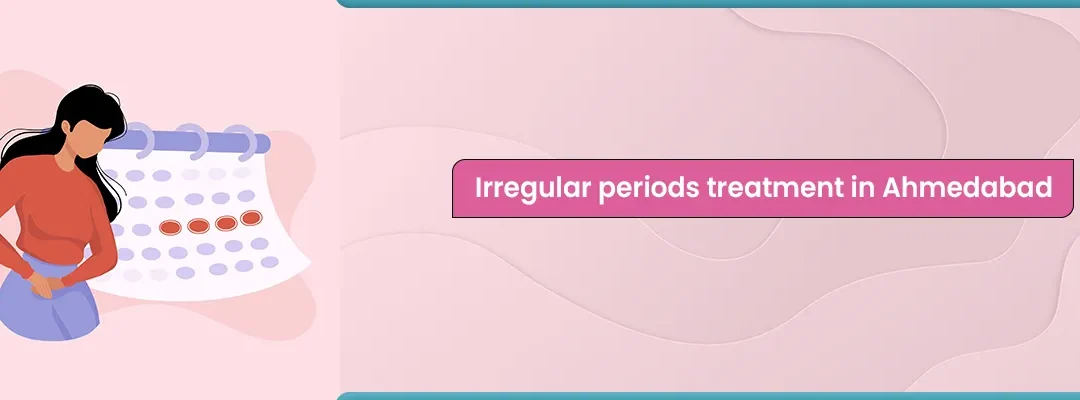Menstrual periods usually stay four to seven days for most women. A woman’s period generally lasts twenty-eight days, but menstrual cycles can last anywhere from twenty-one to thirty-five days. If you get your periods before 21 days or after 35 days, then it is considered abnormal.
What is abnormal menstruation?
Menstrual periods usually stay four to seven days for most women. A woman’s period generally lasts twenty-eight days, but menstrual cycles can last anywhere from twenty-one to thirty-five days.
If you get your periods before 21 days or after 35 days, then it is considered abnormal.
So, now, do you think you have abnormal menstruation?
Consult Dr.Himali Maniar in Ahmedabad to solve your condition.
Menstrual problems can include the following:
- Periods that get separated by less than twenty-one days or more than thirty-five days
- Two or more missed periods consecutively.
- Intermenstrual spotting or bleeding; that is bleeding or spotting between 2 cycles.
- Much lighter or heavier menstrual flow than normal.
- Periods that remain more than seven days.
- Periods having marked discomfort, nausea, vomiting, or cramping.
- Spotting or bleeding that occurs after menopause, between periods, or after sex
If you have noticed any of the above signs, do not wait and consult an experienced gynecologist in Ahmedabad.
The following are some abnormal menstruation examples:
- Amenorrhea is a disorder in which a woman’s menstrual periods have entirely stopped. (Unless the woman is going through menopause, pregnant or breastfeeding); then, missing her period is abnormal. It usually happens for women between forty-five and fifty-five; which is the peri-menopausal age group.
- Having fewer than 6-8 period cycles a year is known as oligomenorrhea.
- Severe menstrual cramps and period pain are known as dysmenorrhea. Most women experience discomfort during their cycles.
- Abnormally heavy menstrual bleeding is called menorrhagia
- Abnormal uterine bleeding includes:
1. A heavier menstrual flow
2. A period that stays more than seven days;
3. Spotting or bleeding between periods, after sex, or after menopause.
What causes irregular periods (menstruation)?
Various factors can cause Abnormal periods. It ranges from stress to more severe medical conditions:
Factors that affect a woman’s menstrual cycle include:
- Stress and lifestyle: The below mentioned are things that can have an impact on a woman’s menstrual cycle:
- Losing or gaining significant weight.
- Dieting.
- Changes in travel, exercise routines, lifestyle, and/or illness.
- Other disruptions in a woman’s daily routine.
- Birth control pills: The hormones progestin and estrogen are present in most birth control pills. The drugs work by preventing the ovaries from discharging eggs, which prevents pregnancy. Menstruation can be affected by taking or not taking birth control pills especially if the patient has hormonal issues, PCOS, etc.
- Fibroids or uterus polyps: Tiny benign (noncancerous) growths in the uterine lining are called uterine polyps. Uterine fibroids are uterine tumors that join the uterine wall. One or more fibroids, ranging in size from an apple seed to a grapefruit, can be present. Although benign, these tumors cause heavy bleeding and pain during periods. Further, If the fibroids are enormous, they may press against the rectum or bladder, causing pain or bladder/bowel issues.
- Endometriosis: Every month, the endometrial tissue that lines the uterus breaks. Then it gets flushed out with the menstrual flow. Endometriosis is a condition in which endometrial tissue grows outside of the uterus. Endometrial tissue frequently adheres to the fallopian tubes or ovaries. Also, on other organs in the lower digestive tract and the space between your uterus and rectum.
Endometriosis can lead to the following:
- Irregular bleeding
- Cramps
- Pain during and before periods
- Painful intercourse.
Pelvic inflammatory disease (PID):
It is a condition in which bacterial infection affects the female reproductive system. Bacteria can enter the vaginal canal. Then it spreads to the uterus and then to the upper genital tract. Bacteria can also get into the reproductive tract. This intrusion can happen through gynecological procedures, miscarriage, childbirth, or abortion.
PID symptoms include:
- Heavy vaginal discharge having an unpleasant odor
- Irregular periods
- Lower and pelvic abdominal pain
- Fever
- Diarrhea
- Nausea
- Vomiting
Polycystic ovary syndrome (PCOS):
It is a type of polycystic ovary syndrome. The ovaries produce many androgens, which are male hormones, in polycystic ovary syndrome (PCOS). In the ovaries, tiny fluid-filled sacs (cysts) can form. On ultrasound, these are frequently visible at the periphery of the ovary. Because hormonal changes can stop eggs from maturing, ovulation may not occur regularly. Women with polycystic ovary syndrome may or may not experience irregular periods.
The exact cause of this condition is unknown, but it could be due to a hormonal imbalance. Also, the disease may be related to infertility, obesity, acne, and hirsutism (excessive hair growth). Treatment for PCOS is dependent on whether a woman wishes to become pregnant. If pregnancy is not a goal, oral contraceptives, weight loss, and diabetes medication can help regulate women’s cycles. You may be given ovulation-stimulating medicines if you wish to get pregnant.
Premature ovarian insufficiency:
This condition affects women under 40 years of age, who have a problem with their ovaries. Like menopause, the menstrual cycle comes to an end. The following people may experience this condition:
- Patients receiving radiation and chemotherapy for cancer.
- Those with a family background of premature ovarian insufficiency.
- Specific chromosomal abnormalities.
Consult your doctor if this happens to you.
Other reasons for irregular menstruation involve:
- Cervical cancer or uterine cancer
- Medicines like anticoagulant drugs (blood thinners) and steroids
- Medical conditions like bleeding disorders affecting hormonal balance
- An overactive or underactive pituitary disorder or thyroid gland affecting hormonal balance
- Pregnancy complications.
- It also involves an ectopic pregnancy. In an ectopic pregnancy, the fertilized egg gets implanted outside the uterus, for instance, in the fallopian tube.
What are the signs and symptoms of abnormal menstruation (periods)?
If your menstrual cycle has changed in any way, you should keep track of when your period starts and ends. Further, keep track of the amount of blood flow and whether you pass significant blood clots. Other symptoms to keep track of include – bleeding between periods and menstrual pain or cramps.
What happens when you visit your gynecologist?
Your gynecologist will enquire regarding your menstrual cycle and shall take your detailed medical history. They will conduct a physical test which may include a Pap test and a pelvic exam. Specific tests, such as the ones listed below, may be ordered by the doctor:
- Blood tests rule out anemia and other medical conditions.
- Cultures of the vaginal mucosa to look for infections
- An ultrasound examination of the pelvis to look for polyps, uterine fibroids, and ovarian cyst.
- An endometrial biopsy is a procedure. It involves removing a tissue sample from the uterine lining.
- Laparoscopy: It consists of a doctor making a small incision on the abdomen and inserting a camera (endoscope) with a light to view the ovaries and uterus. The procedure helps to diagnose endometriosis, genital tract infections, or abnormalities.
What is the treatment for irregular menstruation (periods)?
The underlying cause determines treatment for irregular menstruation:
Menstrual cycle regulation: Hormones like progestin may help regulate heavy bleeding.
Pain relief: You can take an over-the-counter pain reliever like ibuprofen or acetaminophen. It can help with mild to moderate pain or cramps. Warm baths or showers, as well as the use of a heating pad, may help to relieve cramps.
Uterine fibroids: Doctors can treat Fibroids in the uterus surgically or medically. You can treat most fibroids with mild symptoms with over-the-counter pain relievers at first. An iron supplement may be beneficial in treating or preventing anemia if you have heavy bleeding. Fibroids can cause heavy bleeding, but progestin injections or low-dose birth control pills can control it.
Certain drugs can shrink and control heavy bleeding from fibroids. Such drugs decrease estrogen production in the body and temporarily stop menstruation. Sometimes fibroids do not respond to medication. So, several surgical options can help reduce or remove the fibroid’s symptoms and size. The fibroids’ kind, size, and location will determine the procedure type.
The removal of a fibroid is known as a myomectomy. You may require a hysterectomy in severe cases where the fibroids are large or cause heavy pain or bleeding. The fibroids get removed along with the uterus during a hysterectomy. Uterine artery embolization, which cuts off the blood supply to the active fibroid tissue, is another option.
Endometriosis: There is no cure for endometriosis. Still, Pain relievers (both over-the-counter and prescription) may help to alleviate the discomfort. Hormone therapy, like birth control pills, can help prevent uterine tissue overgrowth. It can also reduce blood loss during periods. In severe cases, gonadotropin-releasing hormone agonist or progestin may help.
It can stop menstrual periods temporarily. You may need surgery to remove extra endometrial tissue developing in the abdomen or pelvis in extreme cases. If the uterus is severely damaged, a hysterectomy may be necessary as a last resort.
How can you decrease the abnormal menstruation risk?
Below are a few suggestions:
- You can maintain a healthy lifestyle. You should exercise moderately and eat nutritious foods. If you want to lose weight, do so gradually. Do not turn to diets that drastically limit your nutrition and calorie intake.
- Ensure you take enough rest.
- You can practice stress relaxation and reduction methods.
- See a doctor for regular check-ups.
When should you get medical attention for abnormal periods?
Consult your doctor if you have any of the below symptoms:
- Severe pain between periods or during your period
- Abnormal heavy bleeding (soaking through a sanitary tampon or pad each hour for two to three hours) or passing large clots
- An irregular or foul-smelling vaginal discharge
- High fever
- A period lasting longer than seven days
- Vaginal spotting or bleeding between periods or after you have gone through menopause.
- Vomiting or Nausea during your period
- Toxic shock syndrome’s symptoms, like a fever over 102 degrees, vomiting, diarrhea, dizziness, or fainting
You should consult a specialist if you experience any menstrual abnormalities or irregularities or if think you may be pregnant.

